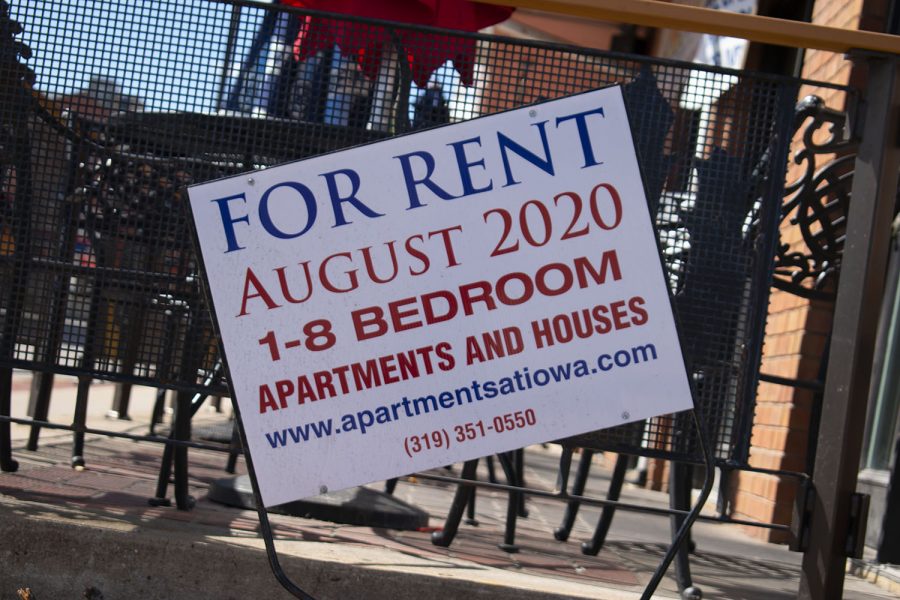Opinion | Promoting housing discrimination is wrong in every instance
Passing SF 252 would allow housing discrimination based on income.
Sign seen on South Gilbert Street on Wednesday, Sept. 30, 2020.
March 8, 2021
Our lawmakers are facilitating housing discrimination if SF 252 passes through the Iowa Legislature. Current ordinances on the books in Iowa City, Des Moines, and Marion prevent landlords from denying a tenant if they use a federal housing voucher. SF 252 seeks to rescind these ordinances, and prevent any in the future, effectively opening the door to housing discrimination based on income.
Over 1300 individuals are currently receiving housing aid from the Iowa City Housing Authority. In the state of Iowa alone, 20,489 families used a federal housing subsidy.
In the U.S., over 10.4 million people were available to afford housing because of receiving federal rental assistance. Twelve states, Washington D.C, and multiple other localities across the country adopted source of income ordinances. These mandates are vital for two reasons.
Source of income ordinances protect renters from discrimination, just as housing laws regarding age, race, or ability do. Removing these ordinances in Iowa cities would hinder the ability to select housing. Source of income protections actively help facilitate the goals of housing voucher programs.
In 2016, Iowa City adopted the ordinance in order to protect those that receive housing vouchers from the U.S. Department of Housing and Urban Development, or those that receive a voucher from the Iowa City Housing Authority.
The ordinance outlined the unlawfulness of landlords directly or indirectly saying they won’t accept a tenant with a housing voucher. This was a necessary safeguard, allowing people the same opportunities to rent an apartment, regardless of how it was paid for.
The ordinances do not require a property owner to rent to an individual with a housing voucher, but rather the subsidy cannot be the basis on which that renter is denied. Individuals lobbying in the interests of landlords claim that property owners are excessively burdened by the ordinances.
The process of using a housing voucher works as the federal government provides funding to local housing agencies, who then create a contract with property owners. This process is relatively simple for landlords, considering their only duties are to maintain building standards.
According to this argument, practicing non-discrimination is burdensome for property owners. Imagine how burdened those with a rental subsidy would feel if they could be denied solely on this basis.
Passing this bill would encourage only those individuals with a high enough income have more choices as to where they live. Everyone is equally deserving of decent shelter and the opportunity to have choices on where to live, regardless of income.
University of Iowa professor Carrie Schuettpelz, who worked as a homeless policy advisor in the Obama administration, is an expert on affordable housing and fair housing practices.
“Denying tenancy solely based on whether someone has a federal subsidy is discrimination, pure and simple,” Schuettpelz said.
Schuettpelz said that the program also opens up more housing opportunities for families.
“The goal of the Housing Choice Voucher program is to give families freedom of choice over where they live. And, if suddenly it’s acceptable for landlords to discriminate against families with these subsidies, they will no longer have that freedom,” Schuettpelz said.
Passing SF 252 would send the message that Iowa’s politicians don’t care about protecting low-income individuals from housing discrimination.
Columns reflect the opinions of the authors and are not necessarily those of the Editorial Board, The Daily Iowan, or other organizations in which the author may be involved.














